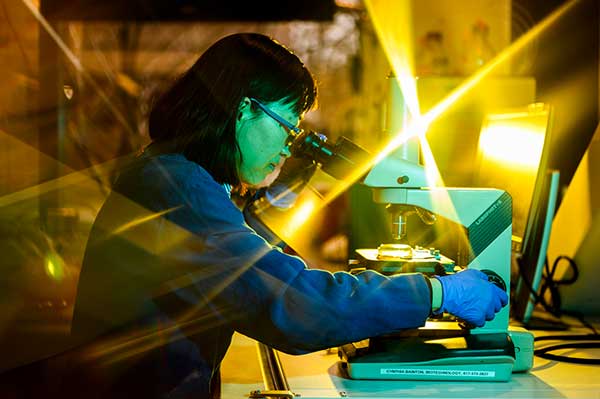Northeastern Research Study Shows the Potential of AI for Stem Cell Manufacturing

MIE Assistant Professor Wei Xie, the primary investigator for a Northeastern research study on bio-drug automation and manufacturing, explains the part that AI can play in successful cell cultivation. Two papers recently published by Xie and her co-authors propose models for predicting mechanisms in both singular cells and clusters of cells.
This article originally appeared on Northeastern Global News. It was published by Alena Kuzub. Main photo: Wei Xie, assistant professor of mechanical and industrial engineering, says Northeastern has started to take the lead on new generation bio-drug manufacturing and automation. Photo Matthew Modoono/Northeastern University
Northeastern scientists propose AI framework for mass-manufacturing of stem cells for regenerative medicine
Some stem cells have a natural ability to divide into more cells and develop into various specialized blood, bone or muscle cells. These pluripotent stem cells offer great promise for new cell treatments and regenerative medicine, researchers say.
A new study by a group of Northeastern University scientists shows that artificial intelligence can be used for the large-scale manufacturing of pluripotent stem cells, which could be used in the treatment of cancer, Alzheimer’s or Parkinson’s, to repair spinal cords or counteract aging.
The researchers say their innovative modular framework, Biological System-of-Systems, sets the fundamental stage for understanding and predicting successful cell cultivation.
“It is a frontier,” says Wei Xie, assistant professor of mechanical and industrial engineering, who was the primary investigator for the research. “Northeastern has started to take the lead on new generation bio-drug manufacturing and automation.”

Induced pluripotent stem cells have a huge potential market, says Wei Xie, assistant professor of mechanical and industrial engineering at Northeastern. Photo by Matthew Modoono/Northeastern University
Xie and her co-authors recently published two papers that propose models that will help understand and predict the fundamental mechanisms happening in a singular cell and in a cluster of cells to achieve successful cultivation of healthy human induced pluripotent stem cells, or iPSCs, at scale.
There are different types of stem cells, including embryonic stem cells found in the early stages of embryo development; adult stem cells that can replace damaged cells; and so-called induced pluripotent stem cells, produced in the laboratory from adult stem cells made to behave like embryonic stem cells.
Because of their regenerative capabilities and potential to transform into any cell type in the body, iPSCs have a huge potential market to support various treatment and research applications, Xie says. They could be used for regenerative medicine and cell therapies to counteract global population aging, diseases such as cancer, Alzheimer’s or Parkinson’s, or to repair spinal cord and other injuries. Clinical trials of new drugs, she says, will also need a large stem cell supply of high quality.
That is why researchers and industry collaborators are already thinking about large-scale iPSC manufacturing and automation, Xie says.
“Manufacturing of the future involves complex cyber-physical systems [which seamlessly integrates computation and physical components and connects them to the Internet and to each other],” Xie says. “It should be fast, flexible and robust so that if iPSCs need to be differentiated to a different cell type, it doesn’t take a lot of [additional] expensive experiments and a lot of time.”
AI and machine learning can help that, she says.
 |
 |
Wei Xie, assistant professor of mechanical and industrial engineering, focused at first on understanding cellular metabolisms, or life-sustaining biological, physical and chemical processes in a single stem cell. Photos by Matthew Modoono/Northeastern University
Xie and her research team focused at first on understanding the basics — cellular metabolisms, or life-sustaining biological, physical and chemical processes and their interaction, in a single human iPSC.
“A cell is a very complex system,” Xie says.
Each cell is composed of a complex metabolic and gene network; ribonucleic acid, or RNA, essential for most biological functions; proteins and so on. This system behaves differently in different conditions. That affects a cell’s intake of nutrition, for example, and eventually impacts the quality of the cells produced.
Read full story at Northeastern Global News
See related story: Research to Optimize Large-Scale IPSC Manufacturing